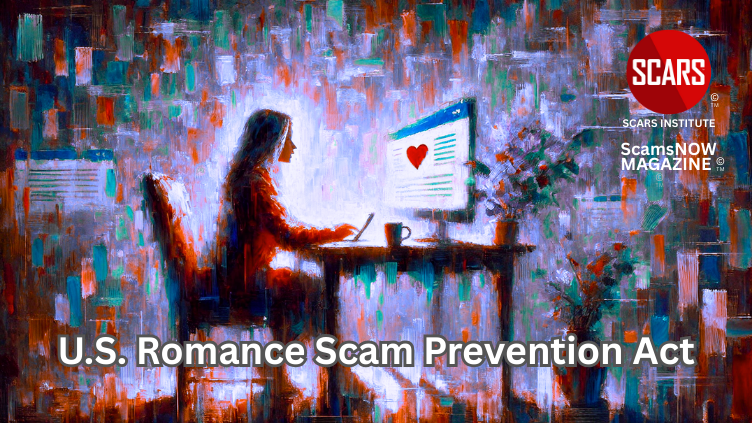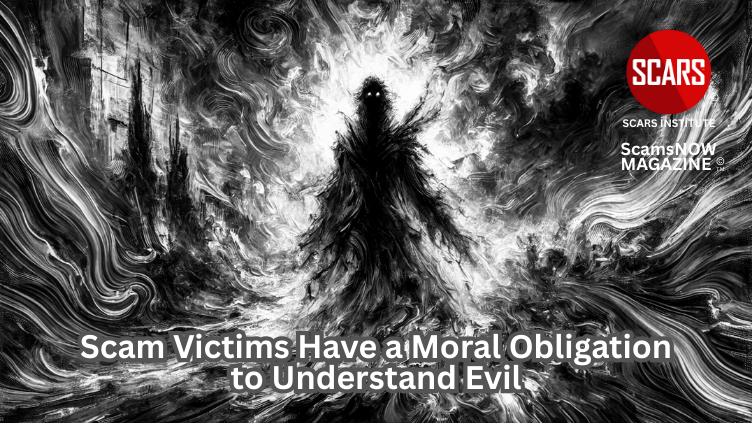Relaxing to ‘True Crime’ TV Shows Can Be a Red Flag for Psychological Issues
When True Crime (TV, Podcasts, etc.) Becomes a Coping Mechanism: The Psychological Impact of Watching Crime TV to Relax
Primary Category: Scam Victim Recovery Psychology
Intended Audience: Scam Victims-Survivors / Family & Friends
Author:
• Tim McGuinness, Ph.D., DFin, MCPO, MAnth – Anthropologist, Scientist, Polymath, Director of the Society of Citizens Against Relationship Scams Inc.
About This Article
Watching true crime as a way to relax may indicate underlying psychological concerns such as heightened anxiety, emotional desensitization, or unresolved trauma. While some viewers are drawn to it for entertainment, control, or preparation against crime, excessive consumption can reinforce hypervigilance, disrupt sleep, and create a distorted perception of reality.
Scam victims, in particular, may turn to true crime as a way to regain control, but it can instead deepen fear and distrust. Moderation is essential—when crime content becomes a primary coping mechanism, self-reflection and healthier relaxation methods are necessary for emotional well-being and recovery.

When True Crime (TV, Podcasts, etc.) Becomes a Coping Mechanism: The Psychological Impact of Watching Crime TV to Relax
Introduction
Psychologists suggest that relaxing by watching true crime TV might be a red flag because it could reflect underlying psychological patterns or needs that aren’t entirely healthy. The appeal of true crime often lies in its mix of suspense, fear, and resolution—elements that can stimulate the brain in ways that feel oddly soothing. But leaning on it as a primary way to unwind might signal issues like heightened anxiety, a need for control, or even a desensitization to violence, depending on the individual.
Overview
Psychologists warn that using true crime TV as a means of relaxation can be problematic for several reasons:
Increased anxiety and hypervigilance: Consuming excessive true crime content can lead to heightened anxiety and a state of hypervigilance, where individuals constantly perceive danger in their surroundings.
Distorted perception of reality: True crime shows can skew one’s view of the world, making it seem more dangerous than it actually is. This can result in an overestimation of the prevalence of violent crimes.
Sleep disturbances: The graphic and disturbing nature of true crime content can interfere with sleep patterns, making it difficult to relax and rest properly.
Social isolation: In extreme cases, overconsumption of true crime media can lead to fear of socialization, causing individuals to isolate themselves and avoid leaving their homes.
Negative impact on mental health: Excessive exposure to true crime content can contribute to the development or exacerbation of mental health issues such as anxiety, depression, and panic attacks.
Desensitization: Regular viewing of violent crime scenes may lead to desensitization, which can be problematic for maintaining empathy and appropriate emotional responses.
Obsessive thoughts: Some individuals may develop obsessive thoughts about crime and safety, which can interfere with daily life and overall well-being.
While some people claim that true crime content helps them feel more prepared for dangerous situations, psychologists emphasize that moderation is key. If true crime consumption begins to negatively impact one’s mental health, social life, or daily functioning, it’s a sign to take a break and seek alternative forms of relaxation and entertainment
Digging In Deeper
Psychologists caution that using true crime TV as a form of relaxation can be a red flag for underlying psychological stress, emotional desensitization, or unresolved trauma. While many people enjoy true crime content for entertainment or educational purposes, regularly unwinding with violent or disturbing crime stories may indicate deeper concerns. Here’s why:
Chronic Stress and Anxiety
Watching true crime to relax can signal that the nervous system is already in a heightened state of stress. If someone finds comfort in high-adrenaline content, it may mean their baseline stress levels are already elevated. Instead of calming the mind, exposure to crime stories can reinforce hypervigilance, making it harder to fully relax.
In the case of stress regulation, Psychologist Pamela Rutledge explains that true crime can offer a “safe” way to experience adrenaline and then relax as the case resolves, satisfying a primal curiosity about danger without real risk. However, if this becomes a go-to coping mechanism, it might indicate someone’s drawn to chaos or trauma as a way to process their own unresolved emotions—essentially outsourcing their stress to a narrative they can switch off. Over time, this could reinforce anxiety rather than diffuse it, as the mind stays hooked on threat-based stimulation.
Emotional Desensitization
Repeated exposure to violent crimes can lead to emotional numbing, where disturbing content no longer elicits strong reactions. This desensitization can reduce empathy over time, making real-world violence feel less shocking or significant. It might also indicate that a person is struggling with emotional regulation and is unconsciously using true crime to suppress feelings rather than process them.
Another concern is desensitization and research, like that from the American Psychological Association, shows prolonged exposure to violent media can numb emotional responses to real-world harm. If someone finds murder documentaries relaxing, it might suggest they’ve normalized violence to an unhealthy degree, blunting empathy or skewing their perception of safety. Forensic psychologist Katherine Ramsland notes that true crime fans sometimes develop a “morbid curiosity” that, while not inherently bad, can tip into obsession or detachment if it’s their main lens for relaxation.
Unresolved Trauma or Fear of Victimization
Some people gravitate toward true crime because they relate to the fear of being victimized. For those who have experienced past trauma—such as abuse, assault, or fraud—watching these stories may feel like a way to gain control over their own fears. However, instead of helping, this exposure can reinforce a heightened sense of danger, leading to increased anxiety, distrust, or even paranoia.
Dopamine and Morbid Curiosity
Consuming true crime activates the brain’s reward system by stimulating curiosity, even when the content is disturbing. Some individuals may become reliant on this form of stimulation, preferring it over healthier ways to relax. Over time, this can create a cycle where relaxation is only achieved through dark, high-adrenaline narratives rather than activities that promote true emotional well-being.
Sleep Disruption and Increased Fear Responses
Many psychologists warn that consuming violent media before bed can increase nightmares, disrupt sleep, and reinforce negative thought patterns. The subconscious mind processes crime narratives overnight, potentially leading to heightened fear responses, increased worry about personal safety, or intrusive thoughts.
For Scam Victim-Survivors
If a scam victim watches excessive true crime TV, it may indicate deeper psychological responses to their experience with fraud. While some victims find comfort in understanding criminal behavior, overconsumption of true crime content can reflect unresolved trauma, heightened fear, or an unhealthy attempt to regain control.
Here’s what it might suggest:
Heightened Hypervigilance and Distrust
Many scam victims struggle with feelings of betrayal and a loss of trust in others. Watching true crime excessively—especially stories about fraud, deception, and manipulation—may reinforce a hypervigilant mindset, where the victim feels constantly on guard against future scams. This can lead to anxiety, paranoia, and difficulty trusting even legitimate people or institutions.
A Need to Reassert Control
Scam victims often feel powerless, especially if they were manipulated into making financial or emotional decisions against their better judgment. Consuming true crime may serve as a way to analyze criminal tactics, helping them feel more prepared or “in control” should they encounter deception again. However, this can become obsessive, preventing victims from moving forward with their lives.
Unresolved Trauma and Emotional Processing
Victims of scams experience similar psychological effects to victims of other crimes—shame, anger, and self-blame. Watching true crime may be an unconscious attempt to process their own experience by seeing how other victims and criminals interact. However, instead of resolving trauma, it may prolong distress by reinforcing negative emotions and preventing emotional closure.
Confirmation Bias and Reinforcing a Negative Worldview
Excessive true crime consumption can reinforce the belief that crime and deception are everywhere, making scam victims more fearful and distrusting of others. This can make recovery more difficult, as victims may withdraw socially, avoid seeking help, or assume that all financial institutions, authorities, or even personal relationships are potential threats.
Addiction to Fear and Adrenaline
Some scam victims may find themselves drawn to true crime as a way to relive the emotional highs and lows they experienced during the scam itself. Fraud, especially romance or investment scams, often involves an emotional rollercoaster—hope, excitement, fear, and ultimately, devastation. Watching crime stories that evoke similar feelings can become an unhealthy coping mechanism.
When It Becomes a Problem
Watching true crime occasionally is not necessarily harmful, but if a scam victim finds themselves obsessing over criminal cases, feeling more anxious rather than informed, or struggling to engage in positive, restorative activities, it may be a sign that they need support in processing their experience. Healthy recovery involves balancing awareness with emotional well-being—seeking therapy, engaging in uplifting activities, and rebuilding trust, rather than dwelling in a constant state of fear.
Conclusion
Watching true crime as entertainment is not inherently harmful, but when it becomes a primary method of relaxation, it may indicate deeper psychological patterns that should not be ignored. For some, it satisfies curiosity, provides a sense of control, or even acts as a coping mechanism. However, psychologists caution that excessive consumption can lead to heightened anxiety, emotional desensitization, disrupted sleep, and an increased sense of paranoia. For scam victims, true crime may reinforce hypervigilance, distrust, and fear, making recovery more difficult. While occasional viewing is normal, relying on it for comfort is a sign to examine one’s emotional state and seek healthier ways to process stress. If true crime is your only way to unwind, it’s worth asking why—self-reflection and balance are key to maintaining emotional well-being.
-/ 30 /-
What do you think about this?
Please share your thoughts in a comment below!
Statement About Victim Blaming
SCARS Institute articles examine different aspects of the scam victim experience, as well as those who may have been secondary victims. This work focuses on understanding victimization through the science of victimology, including common psychological and behavioral responses. The purpose is to help victims and survivors understand why these crimes occurred, reduce shame and self-blame, strengthen recovery programs and victim opportunities, and lower the risk of future victimization.
At times, these discussions may sound uncomfortable, overwhelming, or may be mistaken for blame. They are not. Scam victims are never blamed. Our goal is to explain the mechanisms of deception and the human responses that scammers exploit, and the processes that occur after the scam ends, so victims can better understand what happened to them and why it felt convincing at the time, and what the path looks like going forward.
Articles that address the psychology, neurology, physiology, and other characteristics of scams and the victim experience recognize that all people share cognitive and emotional traits that can be manipulated under the right conditions. These characteristics are not flaws. They are normal human functions that criminals deliberately exploit. Victims typically have little awareness of these mechanisms while a scam is unfolding and a very limited ability to control them. Awareness often comes only after the harm has occurred.
By explaining these processes, these articles help victims make sense of their experiences, understand common post-scam reactions, and identify ways to protect themselves moving forward. This knowledge supports recovery by replacing confusion and self-blame with clarity, context, and self-compassion.
Additional educational material on these topics is available at ScamPsychology.org – ScamsNOW.com and other SCARS Institute websites.
-/ 30 /-
What do you think about this?
Please share your thoughts in a comment below!
Important Information for New Scam Victims
- Please visit www.ScamVictimsSupport.org – a SCARS Website for New Scam Victims & Sextortion Victims.
- SCARS Institute now offers its free, safe, and private Scam Survivor’s Support Community at www.SCARScommunity.org – this is not on a social media platform, it is our own safe & secure platform created by the SCARS Institute especially for scam victims & survivors.
- SCARS Institute now offers a free recovery learning program at www.SCARSeducation.org.
- Please visit www.ScamPsychology.org – to more fully understand the psychological concepts involved in scams and scam victim recovery.
If you are looking for local trauma counselors, please visit counseling.AgainstScams.org
If you need to speak with someone now, you can dial 988 or find phone numbers for crisis hotlines all around the world here: www.opencounseling.com/suicide-hotlines
Statement About Victim Blaming
Some of our articles discuss various aspects of victims. This is both about better understanding victims (the science of victimology) and their behaviors and psychology. This helps us to educate victims/survivors about why these crimes happened and not to blame themselves, better develop recovery programs, and help victims avoid scams in the future. At times, this may sound like blaming the victim, but it does not blame scam victims; we are simply explaining the hows and whys of the experience victims have.
These articles, about the Psychology of Scams or Victim Psychology – meaning that all humans have psychological or cognitive characteristics in common that can either be exploited or work against us – help us all to understand the unique challenges victims face before, during, and after scams, fraud, or cybercrimes. These sometimes talk about some of the vulnerabilities the scammers exploit. Victims rarely have control of them or are even aware of them, until something like a scam happens, and then they can learn how their mind works and how to overcome these mechanisms.
Articles like these help victims and others understand these processes and how to help prevent them from being exploited again or to help them recover more easily by understanding their post-scam behaviors. Learn more about the Psychology of Scams at www.ScamPsychology.org
SCARS INSTITUTE RESOURCES:
If You Have Been Victimized By A Scam Or Cybercrime
♦ If you are a victim of scams, go to www.ScamVictimsSupport.org for real knowledge and help
♦ SCARS Institute now offers its free, safe, and private Scam Survivor’s Support Community at www.SCARScommunity.org/register – this is not on a social media platform, it is our own safe & secure platform created by the SCARS Institute especially for scam victims & survivors.
♦ Enroll in SCARS Scam Survivor’s School now at www.SCARSeducation.org
♦ To report criminals, visit https://reporting.AgainstScams.org – we will NEVER give your data to money recovery companies like some do!
♦ Follow us and find our podcasts, webinars, and helpful videos on YouTube: https://www.youtube.com/@RomancescamsNowcom
♦ Learn about the Psychology of Scams at www.ScamPsychology.org
♦ Dig deeper into the reality of scams, fraud, and cybercrime at www.ScamsNOW.com and www.RomanceScamsNOW.com
♦ Scam Survivor’s Stories: www.ScamSurvivorStories.org
♦ For Scam Victim Advocates visit www.ScamVictimsAdvocates.org
♦ See more scammer photos on www.ScammerPhotos.com
You can also find the SCARS Institute’s knowledge and information on Facebook, Instagram, X, LinkedIn, and TruthSocial
Psychology Disclaimer:
All articles about psychology and the human brain on this website are for information & education only
The information provided in this and other SCARS articles are intended for educational and self-help purposes only and should not be construed as a substitute for professional therapy or counseling.
Note about Mindfulness: Mindfulness practices have the potential to create psychological distress for some individuals. Please consult a mental health professional or experienced meditation instructor for guidance should you encounter difficulties.
While any self-help techniques outlined herein may be beneficial for scam victims seeking to recover from their experience and move towards recovery, it is important to consult with a qualified mental health professional before initiating any course of action. Each individual’s experience and needs are unique, and what works for one person may not be suitable for another.
Additionally, any approach may not be appropriate for individuals with certain pre-existing mental health conditions or trauma histories. It is advisable to seek guidance from a licensed therapist or counselor who can provide personalized support, guidance, and treatment tailored to your specific needs.
If you are experiencing significant distress or emotional difficulties related to a scam or other traumatic event, please consult your doctor or mental health provider for appropriate care and support.
Also read our SCARS Institute Statement about Professional Care for Scam Victims – click here
If you are in crisis, feeling desperate, or in despair, please call 988 or your local crisis hotline – international numbers here.
More ScamsNOW.com Articles
A Question of Trust
At the SCARS Institute, we invite you to do your own research on the topics we speak about and publish. Our team investigates the subject being discussed, especially when it comes to understanding the scam victims-survivors’ experience. You can do Google searches, but in many cases, you will have to wade through scientific papers and studies. However, remember that biases and perspectives matter and influence the outcome. Regardless, we encourage you to explore these topics as thoroughly as you can for your own awareness.















![NavyLogo@4x-81[1] Relaxing to 'True Crime' TV Shows Can Be a Red Flag for Psychological Issues - 2025](https://scamsnow.com/wp-content/uploads/2025/04/NavyLogo@4x-811.png)









![scars-institute[1] Relaxing to 'True Crime' TV Shows Can Be a Red Flag for Psychological Issues - 2025](https://scamsnow.com/wp-content/uploads/2025/04/scars-institute1.png)

![niprc1.png1_-150×1501-1[1] Relaxing to 'True Crime' TV Shows Can Be a Red Flag for Psychological Issues - 2025](https://scamsnow.com/wp-content/uploads/2025/04/niprc1.png1_-150x1501-11.webp)